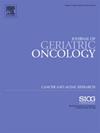Hospitalization due to adverse drug events in older adults with cancer, a retrospective analysis
IF 3
3区 医学
Q3 GERIATRICS & GERONTOLOGY
引用次数: 0
Abstract
Introduction
Geriatric oncology is a rapidly evolving field of practice, where comprehensive geriatric assessments (CGA) and multidisciplinary team (MDT) input have the potential to improve patient outcomes. Polypharmacy and potential drug interactions (PDI) have been associated with an increased risk of adverse outcomes in older adults with cancer, receiving systemic anti-cancer therapy (SACT). Our aim was to assess the incidence of unplanned hospitalization in older adults with cancer attending medical oncology outpatient clinics and to determine whether an unplanned hospitalization was potentially due to an adverse drug event (ADE).
Materials and Methods
We identified patients who attended a medical oncology outpatient appointment from January 1st to March 31st, 2018. Medical records were examined to identify any unplanned hospital admissions between the clinic visit date and three and six months after initial clinic visit. Incidences of unplanned hospitalization were assessed to determine if an ADE potentially occurred.
Results
Data collected from 174 patients were analyzed. Over half (57 %) were female, median age was 75 years and 53 % had a favorable performance status. The most common malignancies were gastrointestinal (GI) at 31 % (n = 54), breast 29 % (n = 51), and genitourinary 22 % (n = 37). Seventy-two percent had advanced disease (Stage III/IV) and 61 % had systemic therapy (SACT and hormonal therapy). Polypharmacy (≥5 medications) was observed in 77 % of patients. The total number of admissions at six months was 99, with 55 % of these potentially due to an ADE. On multivariate analysis performance status (p ≤0.001), monochemotherapy (p = 0.012), polychemotherapy (p ≤0.001) and radiotherapy (p = 0.048), were independent predictors of unplanned hospitalization. Monochemotherapy (p = 0.039), and polychemotherapy (p ≤0.001) were independent predictors of unplanned hospitalization due to ADE on multivariate analysis.
Discussion
We observed that older adults with cancer have a high risk of unplanned hospitalization due to ADE. Medication review as part of a CGA in newly diagnosed older adults with cancer by a clinical pharmacist is recommended. This may identify opportunities to avoid medications that could potentially lead to unplanned hospitalization.
老年癌症患者因药物不良事件住院的回顾性分析
老年肿瘤学是一个快速发展的实践领域,综合老年评估(CGA)和多学科团队(MDT)的投入有可能改善患者的预后。在接受全身抗癌治疗(SACT)的老年癌症患者中,多种药物和潜在药物相互作用(PDI)与不良后果风险增加有关。我们的目的是评估在肿瘤内科门诊就诊的老年癌症患者意外住院的发生率,并确定意外住院是否可能是由于药物不良事件(ADE)。材料与方法选取2018年1月1日至3月31日在肿瘤内科门诊就诊的患者。检查了医疗记录,以确定从门诊就诊日期到初次门诊就诊后3至6个月之间的任何计划外住院情况。评估计划外住院的发生率,以确定是否可能发生ADE。结果对174例患者进行数据分析。超过一半(57%)的患者为女性,中位年龄为75岁,53%的患者表现良好。最常见的恶性肿瘤是胃肠道(GI),占31% (n = 54),乳腺29% (n = 51),泌尿生殖系统22% (n = 37)。72%患有晚期疾病(III/IV期),61%接受全身治疗(SACT和激素治疗)。77%的患者存在多重用药(≥5种药物)。6个月的总入院人数为99人,其中55%可能是由于ADE。多因素分析显示,单次化疗(p = 0.012)、多次化疗(p≤0.001)和放疗(p = 0.048)是意外住院的独立预测因素。多因素分析显示,单化疗(p = 0.039)和多化疗(p≤0.001)是ADE非计划住院的独立预测因素。讨论:我们观察到,老年癌症患者因ADE而意外住院的风险很高。建议临床药师对新诊断的老年癌症患者进行药物审查,作为CGA的一部分。这可以确定避免可能导致意外住院的药物的机会。
本文章由计算机程序翻译,如有差异,请以英文原文为准。
求助全文
约1分钟内获得全文
求助全文
来源期刊

Journal of geriatric oncology
ONCOLOGY-GERIATRICS & GERONTOLOGY
CiteScore
5.30
自引率
10.00%
发文量
379
审稿时长
80 days
期刊介绍:
The Journal of Geriatric Oncology is an international, multidisciplinary journal which is focused on advancing research in the treatment and survivorship issues of older adults with cancer, as well as literature relevant to education and policy development in geriatric oncology.
The journal welcomes the submission of manuscripts in the following categories:
• Original research articles
• Review articles
• Clinical trials
• Education and training articles
• Short communications
• Perspectives
• Meeting reports
• Letters to the Editor.
 求助内容:
求助内容: 应助结果提醒方式:
应助结果提醒方式:


